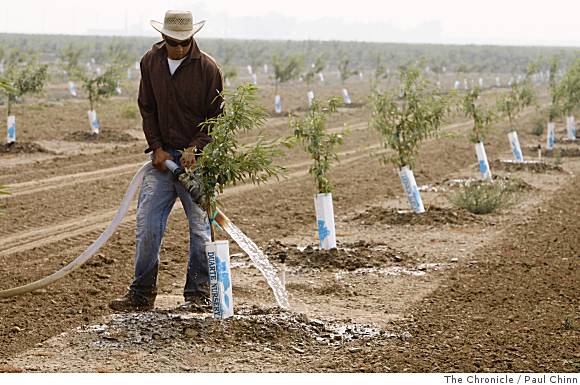Democratic lawmakers call on Senator Feinstein to retract water proposal

 California's Democratic Senator Dianne Feinstein has proposed legislation that would divert a large portion of California's public water supply to Southern California agribusinesses. Feinstein's complete reversal on policy intended to protect the California delta estuary evidences the fact that party platforms mean less to entrenched Washington bureaucrats than the favors they owe their lobbyist allies.
California's Democratic Senator Dianne Feinstein has proposed legislation that would divert a large portion of California's public water supply to Southern California agribusinesses. Feinstein's complete reversal on policy intended to protect the California delta estuary evidences the fact that party platforms mean less to entrenched Washington bureaucrats than the favors they owe their lobbyist allies.
Senator Feinstein is attaching her legislation to a fast-tracked Senate jobs bill under the pretext of raising employment in California's Central Valley. In a letter released Thursday, a dozen Democratic lawmakers from California and Oregon called on Feinstein to retract her water proposal that would allow farmers access to 30% more of their federal water allocation for this year and the next.
Stewart Resnick, billionaire industrial grower and long time campaign contributor to Senator Feinstein, champions the water heist. As one of the richest men in California, Resnick has a vested interest to keep the water flowing over his vast acreage. Here's how progressive columnist Yasha Levine paints Resnick's prolific resume:
"Resnick owns Fiji Water, Pom Wonderful, pesticide manufacturer Suterra and Paramount Agribusiness, the largest farming company in America and the largest pistachio and almond producer in the world. Resnick is also the brain behind a little-known water privatization scheme that brought Enron-style deregulation and privatization to California's water market and made him one of the largest, if not the largest, private water brokers in America. He also happens to be friend and major contributor to Feinstein's political career."
It was through Feinstein that Resnick was able to deliver a personal letter to the White House proposing fewer environmental regulations and more water for his farms. News of this caused a bit of a stir last December but didn't seem to tarnish the Senator's image amongst her liberal supporters.
The critical question that no one seems to be asking here (and I ask this at the risk of sounding obtuse to the uninitiated in the ways of sustainable agriculture) is why do the valley farmers need so much water? Instead of adapting to the demands of nature with sustainable water stewardship and decentralized farming practices, California's agribusinesses are simply asking the government to cut them off a bigger piece of the communal pie. With Governor Schwarzenegger backing Feinstein's water swindle, it seems both parties are willing to overlook the detrimental effects large, conventional farms have not just on California's ecology, but on the survival of its economy. It seems Resnick and his business partners have sway on both side of the aisle. Go figure.
At the heart of the water rights debate is a philosophical struggle between independent, grassroots-policy-thinking and the status quo of the corporate owned two-party system. It brings to light the the true dualism in American politics which isn't liberal verse conservative. It's the entrepreneurial spirit of individuals tackling issues at local and regional levels using sustainable methods, fighting against the top-down, resource allocation model practiced by both major party platforms.
As long as "Republocrats" continue to treat agriculture as an industry – a mechanical system of chemical inputs and biological outputs – there can be no hope for ecological health, much less farm sustainability, within our current political system. The conventional farming model must dramatically change for farmers to survive in an era of peak water. When the priority of agricultural policy shifts from D.C. lobbyists to the unique needs of each individual state, we will then see a return to sustainable farm practices. As farms shrink in size, grow in number, and pollute less, we can look to deregulating agriculture in general. When the state gets its hands out of farming completely, there will be no means or incentive for farmers to expand and ask for destructive political privileges.
The fact is neither party has a plan for food security and water conservation, critical issues for California. It's up to independent minded voters to dismiss partisanship on the whole and create their own policy initiatives that expand the local food movement and grant government land to those willing to grow food for their communities. There is no need to rely on the Stewart Resnicks of the world to feed us.



